What do you do if you have a query or need to find something? Quickly.
If you’re like most people, you open your laptop or unlock your phone, launch a web browser, and navigate to the search bar. After you say or type a few terms and press “enter,” you peruse the results until you find a page that looks promising. After the page loads, you’ll find the answer you’re looking for.
The phrases you type into search engines influence how easy you find a blog or online page, and the same is true for how visitors discover your website. If you want people to find your website, you need to understand what keywords are, why they are important, and the best ways to find them. This post will teach you how to do so successfully and strengthen your content strategy on your own (search) terms.
Navigate to what you need to know first about keywords:
What is a keyword?
Why do keywords matter?
What are some good keywords?
Considerations for Selecting a Keyword
What number of keywords should I use?
How to Find Keywords the Right Way.
How to Create Unique Content with Niche Keywords.
What are keywords?
Keywords are words or phrases that users enter into search engines to find material that matches their searches. Keywords are derived from search queries, therefore including them into your content strategy helps search engines rank your website pages and users locate your content when they search for it. As a result, knowing how to conduct keyword research is critical for identifying keywords relevant to the themes covered on your website and developing effective SEO (search engine optimisation) and PPC (pay-per-click) advertising campaigns.
For example, if you type “Car” into a search engine, the results will reveal a number of results that are related to those keywords:

“Here, the term “cars” is an example of a short keyword; keyword lengths can be classified into two categories:
Short keywords with one or two terms.
Long-tail keywords usually contain three or more terms.
As a result, short keywords typically cover broad topics, whereas long-tail keywords focus on specificity. Consider the following long-tail variant of “Cars” when searching for “Second hand Luxury Cars”:
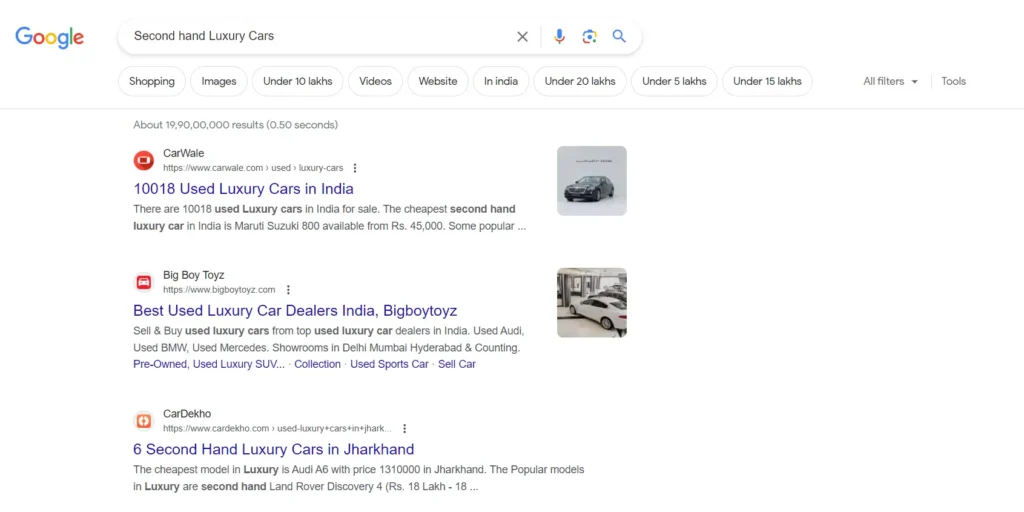
Therefore, understanding the type of keywords to utilise on your website or blog involves some analysis. As you start your keyword research, you’ll see the difference between selecting a relevant keyword and writing for a user’s intent.
The 3 Common Types of Search Intent
Behind every keyword is the reason why the user initiated the search query in the first place. This is referred to as search intent, which is divided into three categories: informative, navigational, and transactional.
Take a look at your keyword and consider what the user is truly asking while making their query:
- If they search “what are nfts,” they are likely looking for informational content that will explain the topic in depth.
- If people search for “nft marketplace,” they are most likely looking for navigational content that will direct them to NFT platforms.
- If people type “best nfts to buy now,” they’re most likely looking for transactional content to help them make a purchase decision.
By addressing the “why” of the search query, you can personalise each content page to provide maximum value to the user while also providing the greatest possible experience. However, in order to completely understand how to give this value, you must first understand the influence of keywords and why they are relevant to your website.
Keywords are still useful tools for conceptualizing and planning your content strategy, but their usefulness is totally dependent on context.
Why are keywords important?
Keywords are crucial because they assist you identify what users are looking for and what material you should offer to fulfil their needs. The keywords you chose influence your content strategy and the topics you include on your website. This entails incorporating the most relevant terms to improve your capacity to rank and, as a result, enhance website traffic.
For example, suppose you’ve authored SEO blogs about different elements of software. If you’ve been fleshing out a subject cluster to demonstrate your content authority, Google will have the context it need to rank websites like yours.

The keywords you include on your pillar and cluster pages will help you create content that addresses a variety of user interests. But, given the paradox of choice, how can you select a decent keyword? Your decision will be influenced by the marketing channel for which you are writing, as well as your short and long-term objectives.Let’s look at how to define effective keywords for SEO and PPC channels so that you can get the most benefits from your content.
What are good keywords?
What constitutes a good keyword in SEO is not the same as what constitutes a suitable target in paid search. But how do SEO keywords and PPC keywords differ on the SERP?
Understanding this distinction necessitates learning how to employ SEO and PPC keywords to your website’s benefit.
Using Keywords in SEO
A good SEO term strikes the right balance of keyword volume, competition, relevance, and intent depending on your website’s authority. As a result, including keywords that cover all of these characteristics can help you rank and increase traffic in the long term.
Furthermore, because SEO keywords are free to rank for and when consumers click on your material, you can derive significant value from the content you create.
While the roster spans both on and off the page, SEO content includes:
- Blogs
- Articles
- Website copy
- Metadata like title tags or meta descriptions
Metadata’s keywords, unlike those in other forms, do not affect ranking. However, best practices recommend including your desired keyword in both the title tag and the description. Take a look at how metadata looks on the SERP, with title tags highlighted in red and descriptions in blue below:

Finding the proper keywords allows you to generate rich content based on what people are interested in while also satisfying Google’s E.A.T. principle – a major Google core change from 2019. Your keywords will be your guide to crafting a post that satisfies the criteria of a search engine, such as Google.
- Expertise
- Authoritativeness
- Trustworthiness
So, before you start searching for keywords, consider the themes that are relevant to your website. What are some of the things your audience would be looking for that might lead them to you? Do you have any ideas? Start there.
Using Keywords in PPC
PPC keywords are on the opposite side of search. PPC keywords are the terms you want to rank for in order to boost brand visibility and website growth. You can bid on your keyword choices, and if you win, you will rank at the top of the search engine results pages, just like the businesses listed below.
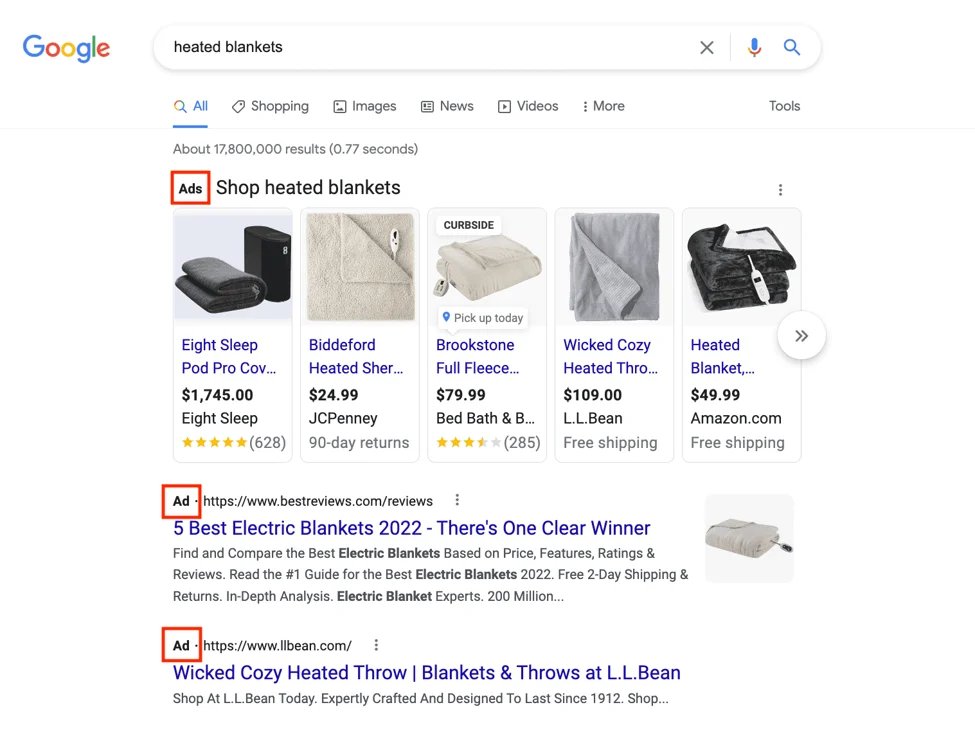
So, you can utilise keywords to generate PPC ads that promote your products or services on platforms such as Google Ads and Microsoft Ads. Then, when users choose your ad, you pay for each click.
There are now two basic types of PPC keywords:
- Branded keywords are words and phrases that contain your brand’s name. Their objective is to attract clients in your target audience who are about to make a purchase choice.
- Non-branded keywords are words or phrases that do not contain your brand’s name. They help you get new consumers who may be looking for what you have to offer but are unaware of it.
Pay-per-click advertising generates immediate traffic, which can be converted into leads or sales. As a result, these conversions provide a faster return on investment for the money and effort you put into your marketing. You’ll utilise PPC keywords to tailor your content to the audiences you want to reach.
When it comes to when to use SEO versus PPC advertising, it all relies on your business objectives. Will your company profit from the long-term influence of Organic Search or the quick results of Paid Search? While you’re thinking about this, keep in mind that SEO content is focused on delivering value to the reader, whereas PPC material is focused on promoting your items or services.
Still, the problematic aspect is that the internet is a bustling place, making it nearly impossible to be the only one blogging about a particular issue. So, even if you develop keyword-rich material that search engines can understand, how do you stand out?
This is when the keywords listed below come into play.
Considerations for Choosing a Keyword
Monthly Search Volume
Monthly search volume (MSV) refers to the number of times a specific keyword is searched in a given month. The popularity of a keyword allows you to adapt your content strategy and write about new content opportunities.
Keyword research tools, such as the one below from Ahrefs, can help you determine how many people are searching for a specific keyword. For example, when you key in the word “insurance,” the tool returns the following MSV estimate, highlighted in red:
What is keyword difficulty?
Keyword difficulty, also known as keyword competitiveness, indicates how tough it is to score well for a certain keyword. In addition to the number of items currently ranking for a term, your domain authority and paid search volume influence the keyword difficulty for every particular search query. The lower the difficulty level, the easier it is to rank for that term.
Competitive keywords with increased difficulty are frequently those in which everyone in an industry wants to rank. Broad keywords, such as “insurance,” “marketing,” or “technology,” will be extremely competitive due to the enormous volume of monthly searches. There is also a lot of written content on these topics competing for keyword rankings.
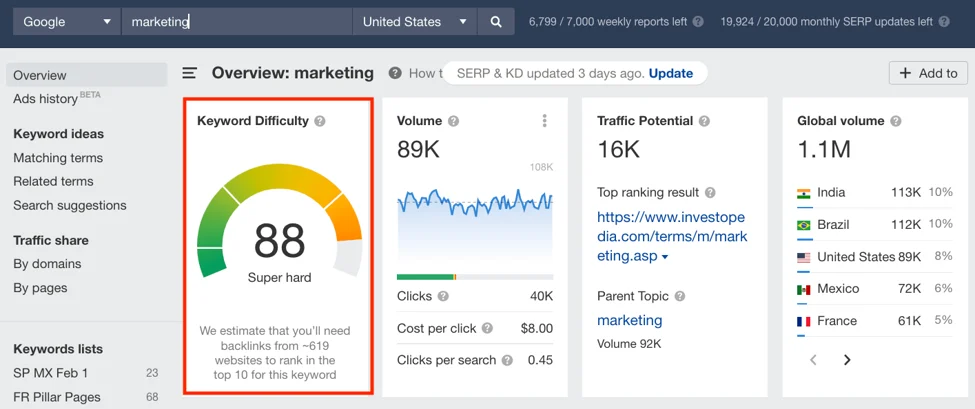
The market for these and related wide search phrases is fully saturated. So establishing a foothold for a search term like “marketing” would be analogous to building a generic coffee shop between a Starbucks and a Dunkin’ Donuts — you might get some business if a customer notices you in your area, but they’re more likely to go to one of the established businesses they know.
For your company to actually improve its SEO rating, it is critical to select less competitive terms. Focusing on less competitive keywords allows you to demonstrate your uniqueness and reach the most relevant audience for your company.
Returning to the coffee shop example, focusing on less competitive keywords is equivalent to establishing yourself as the city’s only’specialty cat cafe’. In this case, it’s easy to stand out because you’re focused on what makes you distinctive to your target consumer demographic.
After all, the person seeking for a cat cafe to sit in and relax is probably not the same person needing a fast cup of coffee on their way to work—just as someone searching for “technology” is not the same person shopping for “small business technology setup service.”
Intent & Relevance
We’ve established that search intent is the “why” behind the terms people search for, but did you realise that search engines utilise this intent to rank pages? This relationship is known as keyword relevance: how closely related a term or phrase is to a piece of material.
For example, suppose you own a baking website and wish to use the keyword “easy cake recipes” in your material. However, rather than publishing a detailed article on these recipes, you focus on the history of cake. This article may be engaging, but it is unrelated to your major keyword, and you are unlikely to rank for it. So keep keyword intent and relevance in mind while you conduct research.
How many keywords should I use?
It’s a time-tested question (in terms of digital marketing): how many keywords should be included in SEO content?
For a long time, digital marketers organised their entire content calendar around specific keywords – and how many times these phrases should appear on the page. Using keyword research tools, they would collaborate with their teams to generate focus keywords related to their products or services. Then, look at all the variations of that term that are most likely to drive website traffic.
Unfortunately, as time passed, publications began keyword stuffing, releasing useless, badly written content with certain keywords solely to boost traffic. Search engines evolved over time, with Google leading the way with its ever-changing search algorithm. Instead, a more contextual approach to digital content was preferred above a simple keyword count.
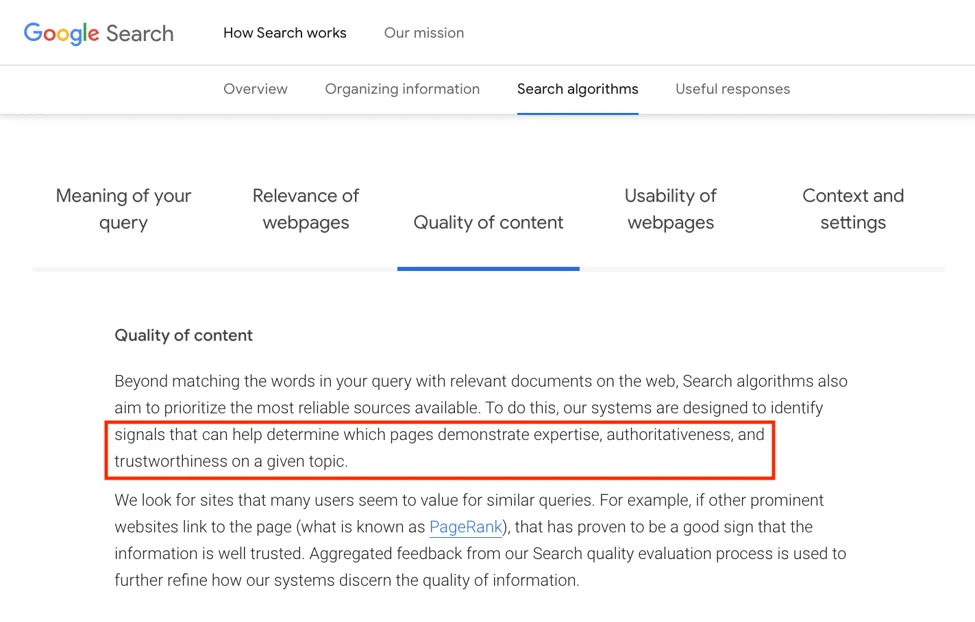
As the value of keywords shifts, so does the importance of how frequently you employ them. However, selecting how many keywords to utilise is
Still worth considering because it is an issue of keyword density: the ratio of keywords on your page to the total word count of the item.
Aside from utilising a formula to establish this ratio, you may perform a competitive study to look at the keyword density for specific phrases that your competitors target.
When it comes to SEO, there is no secret to ranking on the top page of Google. To rank effectively in search engines, you must continuously develop high-quality SEO content and consider how it will work together over time. You should also be clear about your content strategy and the keywords you will use to steer it.
Leveraging keywords to construct your content foundation improves your content marketing strategy and teaches you how to drive traffic to your website; now, we’ll show you how to find them.
How to Find Keywords the Right Way
- Clearly describe your target buyer persona.
- Narrow your target and research keyword competition.
- Collect data, analyse keyword research findings, and repeat.
How to find keywords for your content strategy in Google Keyword Planner
1. Clearly describe your ideal buyer persona.
Having a strong grasp of your intended audience is essential for every marketing endeavour. When conducting keyword research, you must consider what queries or problems you can address for this specific customer persona. At this point, it is acceptable to consider in broad search terms about what those difficulties or questions are.

What Is a Buyer Persona?
A buyer persona is a semi- fictional representation of your ideal customer based on market research and real data about your existing customers.
For example, if you’re a public relations firm, you’ll need to identify leads that want to hire a third party to assist them with a PR campaign. To accomplish this, you may start by creating digital content that answers the question “How to run a successful PR campaign”.
A bigger content subject is an excellent beginning point for creating a pillar page for your topic cluster.
2.Narrow your focus and investigate keyword competition.
Once you’ve determined the general topic or problem to answer, it’s time to become particular. Getting more precise allows you to tailor your content to your intended audience and exploit less competitive keywords.
I prefer to use lsigraph.com to narrow down my focus term. LSI, or latent semantic indexing, is a technique for creating search query variations by evaluating how closely a particular search phrase links to other search terms. Consider latent semantic indexing tools to be a quick and simple technique to brainstorm and generate a large number of keyword ideas.

From there, use keyword tools like Google’s Keyword Planner to analyze a competitive keyword. This analysis allows you to determine which keywords have the most potential for your business.
3. Collect data, analyze keyword research results, and repeat.
When creating content around specific keywords, keep in mind that a skilled content strategist does not simply throw stuff at random to see what sticks. Consider utilising a tool like Google Search Console to monitor how your website performs for specific keywords.
Google Search Console may also show you whether your traffic is increasing from keywords you didn’t intend to rank for, which affects your future digital content strategy. Having this knowledge is essential for fine-tuning your keyword strategy and detecting content gaps that have the potential to bring you new clients.
How to Create Unique Content Through Niche Keywords
What’s fantastic about focusing on less competitive keywords is that it allows you to establish brand authority inside a given industry through well-defined specialty content. Niche content is a specialised writing topic that appeals to a certain audience in order to have a significant impact on your industry’s content market.
Reexamining our “marketing” example above, we can see how tough it is to have an impression in such a saturated industry by publishing broad “marketing” content. But what if your material is aimed at a lengthier, more specialised keyphrase such as “marketing portfolio examples” and a marketer audience looking to establish or strengthen their marketing portfolio?
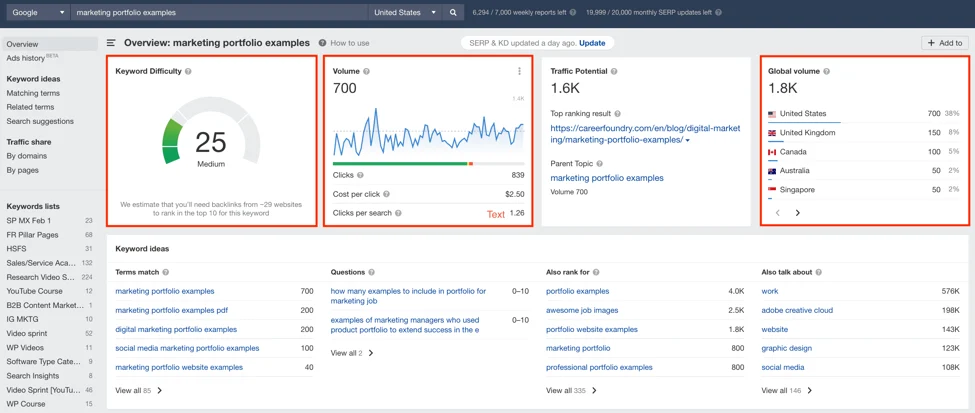
As you can see, despite the fact that the monthly search volume for this keyword is substantially smaller, you will find it easier to gain a foothold in the market due to its lower keyword difficulty. To become more authoritative in your field, you must use long-tail keywords into your content strategy.
Because these keywords have less SEO competition, it is easier to position yourself as a content authority on a specific field – something that is crucial in SEO.
Whether you’re just starting started with keyword planning or want to boost your existing content efforts, keep your consumer persona in mind and don’t be hesitant to adjust your content strategy as you gather more data. Great inbound marketing is about getting the proper material to your ideal potential consumers when they need it, and being strategic with your keyword approach is an excellent way to do that.





Leave A Comment